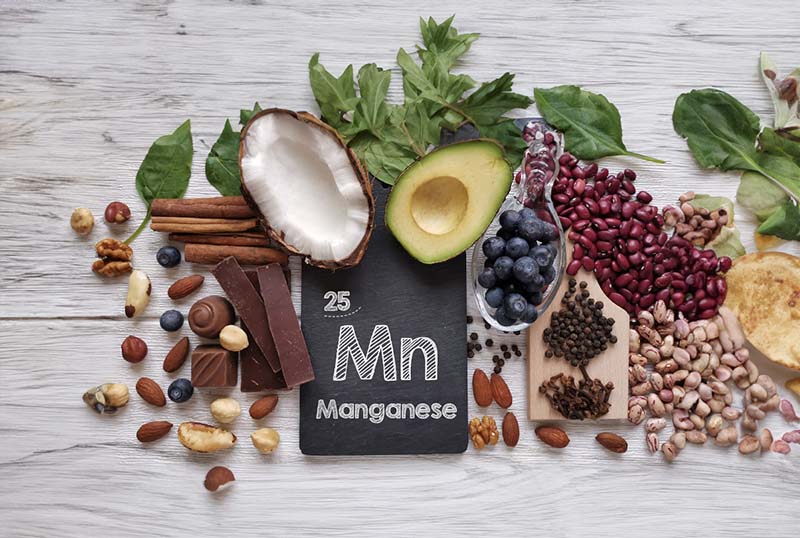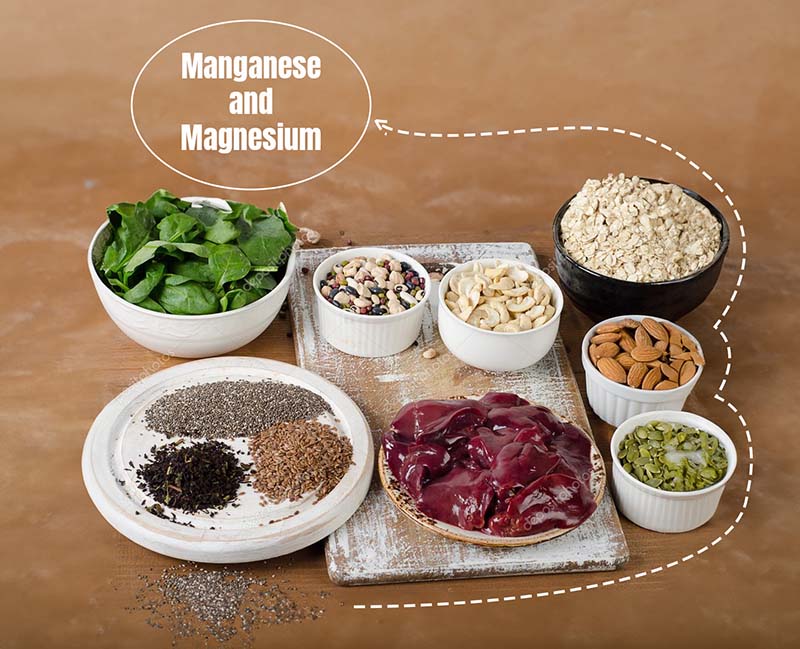Over 30 vitamins and minerals are crucial for maintaining optimal health. These essential nutrients, which the body cannot produce independently, must be obtained through our diet. Key sources of these vital components include fruits, vegetables, and animal-based products such as meat, dairy, and eggs.
Among these essential nutrients, manganese vs magnesium stand out. Regular intake of these minerals is necessary for the smooth functioning of the human body.
Despite the similarity in their names, manganese vs magnesium play unique and significant roles in bodily functions.
This article compares these two minerals in detail. It explores their individual functions, the health benefits they offer, and important safety information. Additionally, the article lists some of the top food sources for manganese and magnesium, providing practical guidance for incorporating these minerals into your diet.
1. What Is Manganese?
Manganese is a crucial mineral that helps with many small but important processes in your body’s cells. It works with enzymes to support normal bodily functions such as digestion, metabolism, growth, reproduction, and creating energy.

Additionally, manganese is important for protecting your cells against damage. It’s a key part of an antioxidant enzyme called manganese superoxide dismutase (MnSOD). This enzyme plays a big role in preventing cell damage caused by a process called oxidation, which can harm your cells.
Researchers are still learning about how exactly MnSOD works. What’s known is that it’s really good at guarding cells, which likely makes it important in preventing diseases like cancer and other long-term health problems.
2. What Is Magnesium?
Magnesium is a very common element on Earth and it’s also really important in our bodies.
This mineral helps with lots of cell activities, like turning on enzymes, making energy, and making sure muscles (including your heart) work the way they should. It’s similar to manganese because both are important for how our cells work.

But, our bodies need a lot more magnesium, and sometimes people don’t get enough. You can find magnesium in many foods, and eating things like beans, nuts, and whole grains usually gives you enough.
Some people might not get enough magnesium, especially older adults, people with type 2 diabetes, those with stomach issues, and people who drink a lot of alcohol.
It’s pretty rare to get too much magnesium from food, but it can happen with supplements or certain medicines. Magnesium is in things like laxatives and heartburn medicines, so taking too much of these, especially with magnesium supplements, can lead to having too much magnesium
3. The Benefits of Manganese and Magnesium
Manganese and magnesium are two essential minerals that play important roles in maintaining good health. Each mineral has its own set of benefits:
3.1 The Benefits of Manganese
Manganese, a strong protector against cell damage, helps to fight off chronic diseases. Regularly getting enough manganese can bring many health benefits:
- Good for Bones: In kids, manganese is important for growing strong bones, and it can help older adults keep their bones strong too.
- Helps with Diabetes: Many studies show that eating foods high in manganese can lower the risk of developing type 2 diabetes.
- Affects Blood Pressure: Some recent research links manganese levels with blood pressure, but more study is needed to fully understand this.
- Important for Brain Health: Manganese is not only key for brain development, but having the right amount might also help prevent brain conditions like Parkinson’s disease and epilepsy.
3.2 The Benefits of Magnesium
Magnesium is important for more than just cell functions; it also brings several health benefits:
- Might Prevent Migraines: Studies suggest that low magnesium levels are common in people with severe headaches. Getting enough magnesium could help avoid migraines, and some studies show magnesium supplements can make them less severe.
- Could Fight Depression: Since magnesium affects the brain, it has been studied for its role in mental health. Many studies have found that not getting enough magnesium is linked to depression.
- May Lower Heart Disease Risk: Magnesium helps control inflammation, which is important for heart health. Not having enough magnesium could lead to high blood pressure, heart and artery problems, and a higher chance of heart disease.
- Might Reduce Diabetes Risk: People with type 2 diabetes often don’t have enough magnesium. Higher magnesium intake can help with insulin resistance, lower diabetes risk, and might reduce inflammation in people with early signs of diabetes.

4. Foods Rich in Manganese and Magnesium
Manganese and magnesium are essential minerals that play vital roles in the body. Foods rich in these minerals can support various bodily functions. Here’s a list of foods that are good sources of manganese and magnesium:
4.1 Foods Rich in Manganese
Manganese is present in a variety of nutritious foods. Excellent sources are:
- Beverages: Black tea and coffee are surprisingly good sources.
- Fruits and Vegetables: Look for manganese in blueberries, pineapple, spinach, and squash.
- Legumes: This category includes chickpeas, lentils, peanuts, and soybeans.
- Nuts and Seeds: Hazelnuts, pecans, and sesame seeds are great choices.
- Shellfish: You’ll find manganese in clams, Pacific oysters, and mussels.
- Whole Grains: Opt for brown rice, oatmeal, and whole-wheat bread.

4.2 Foods Rich in Magnesium
Magnesium can be found in a wide range of foods. Some of the best sources are:
- Dark Leafy Greens: Foods like collard greens, spinach, and Swiss chard are packed with magnesium.
- Dairy and Alternatives: This includes milk, soymilk, and yogurt.
- Fish, Meat, and Poultry: Good sources are chicken breast, halibut, ground beef, and salmon.
- Fruits and Vegetables: Apples, avocados, bananas, broccoli, and potatoes are all magnesium-rich.
- Legumes: Look for magnesium in black beans, edamame, kidney beans, and lima beans.
- Nuts and Seeds: Almonds, cashews, chia seeds, flaxseeds, and pumpkin seeds are excellent choices.

Incorporating these foods into your diet can naturally boost your intake of manganese and magnesium. These minerals are vital for overall health, and getting them from food sources ensures better absorption and reduces the risk of excess intake seen with supplements. A varied diet with these elements can support bone health, brain function, and heart health, among other benefits.
5. Daily Requirements and Dosage
The daily requirements and recommended dosages for manganese and magnesium vary based on age, sex, and other factors like pregnancy and lactation. Here are the general guidelines:
5.1 Manganese
While there’s no set recommended dietary allowance for manganese, adequate intake (AI) values guide our daily needs.
Adult men should aim for 2.3 mg/day, and women for 1.8 mg/day, with a maximum safe limit (Tolerable Upper Intake Level or UL) of 11 mg/day.
Manganese intake recommendations differ by age and gender:
Children:
- Infants up to 6 months: 3 mcg/day
- 7 to 12 months: 0.6 mg/day
- 1 to 3 years: 1.2 mg/day
- 4 to 8 years: 1.5 mg/day
- Boys 9 to 13 years: 1.9 mg/day
- Boys 14 to 18 years: 2.2 mg/day
- Girls 9 to 18 years: 1.6 mg/day
Adults:
- Men 19 years and older: 2.3 mg/day
- Women 19 years and older: 1.8 mg/day
- Pregnant women 14 years and older: 2 mg/day
- Breastfeeding women: 2.6 mg/day
5.2 Magnesium
Magnesium is found in whole grains, nuts and seeds, beans and legumes, and green leafy vegetables. However, many modern diets lack these magnesium-rich foods, leading to the use of supplements.
Men should consume 400–420 mg and women 320–360 mg of magnesium daily. This can be easily met with supplements like Performance Lab NutriGenesis Multi.
The Food and Nutrition Board of the Institute of Medicine in the United States suggests a maximum of 350 mg/day from magnesium supplements under normal circumstances. When choosing a supplement, consider the type of magnesium, as some are absorbed better than others. Common types include:
- Magnesium citrate
- Magnesium oxide
- Magnesium aspartate
- Magnesium chloride
- Magnesium malate
- Magnesium taurate
- Magnesium bisglycinate
- Magnesium lactate
6. Manganese vs Magnesium: Comparison and Evaluation
Although manganese and magnesium sound similar, they are separate minerals with their own roles and characteristics in the human body. Here is the comparison and review of both:

6.1 The Differences Between Manganese vs Magnesium
Manganese and magnesium, though both essential minerals, serve different functions in the human body. Here’s how they compare:
- Element Type: Manganese is a transition metal, while magnesium is an alkaline earth metal. This difference in their chemical nature reflects in their roles in the body.
- Daily Requirement: The body requires significantly more magnesium than manganese. Magnesium’s Recommended Dietary Allowance is higher than that of manganese.
- Usage in the Body: Magnesium is crucial for nearly every cell, helping to regulate minerals and activate enzymes for energy production. It’s also important for heart rhythm. Manganese, on the other hand, plays a key role in metabolism, bone health, and blood clotting.
- Health Benefits: Manganese is beneficial in managing conditions like arthritis and osteoporosis and may ease premenstrual syndrome symptoms. In contrast, a lack of magnesium can lead to weak bones and abnormal heart rhythms.
In summary, magnesium is needed in larger quantities for its widespread role in energy production and heart health. Manganese, as a trace mineral, is essential for metabolism, bone maintenance, and blood clotting.
6.2 Manganese vs Magnesium: Which Is Better?
Neither manganese nor magnesium is superior; they are both indispensable for different reasons. Magnesium, as a macromineral, is needed in larger quantities, while manganese, a trace mineral, is required in smaller amounts. Both play essential roles in health and bodily functions:
- Magnesium is fundamental for almost every cell in the body, regulating minerals and aiding in energy creation.
- Manganese is crucial for metabolic functions, bone health, and blood clotting.
It’s vital to balance both minerals in the body through a nutrient-rich diet and to avoid excessive intake from supplements. This ensures a harmonious blend of these essential minerals for overall health and well-being.
7. Conclusion
In conclusion, the “Manganese vs Magnesium“ discussion highlights the unique and essential roles each mineral plays in our health. While magnesium is required in larger quantities for its extensive functions in energy production and heart health, manganese’s contribution to metabolism, bone health, and blood clotting is equally vital. Understanding the differences and the importance of both minerals is key to maintaining a balanced and healthy lifestyle.
We’d love to hear your experiences and insights on “Manganese vs Magnesium”. Have you noticed any health changes by adjusting your intake of these minerals? Share your stories and feedback with us!
Don’t forget to explore more informative and engaging blogs from Biosculpture. Our content is designed to provide you with the knowledge and tools to sculpt a healthier, more balanced life. Check out our other blogs for more insights into health and wellness!
>>See other comparison articles:
1. The Difference Between Vitamin K Vs Potassium
2. Olive Oil Vs Vegetable Oil: Which Is Better for Your Health?
3. Brown Rice Vs White Rice: Which Type of Rice Is Better?
4. Basmati Vs Jasmine Rice: Exploring Unique Flavors & Recipes


